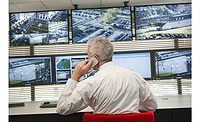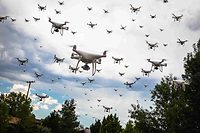The commercial security industry is constantly adapting and innovating, whether it is developing new systems or technologies, the field is always undergoing some sort of change. Over the course of the last several years, cloud-based systems have become a major technology being utilized by end users in industries of all kinds. Cloud-based solutions have become the norm for many integrators, and end users are continuing to demand these types of systems because of their versatility and effectiveness. Not only can these systems perform a variety of functions, but they also provide end users with the prospect of massive cost savings.
A few of the primary factors that make cloud-based solutions attractive to end users is their remote access, cost efficacy, and their ability to rapidly back up and store security data.
Remote Access Offers Flexibility and Cost Effectiveness
Particularly during the Covid-19 pandemic, business and organizations looked for ways to lower their costs, and many turned to cloud-based systems to provide a solution. Perhaps one of the most important benefits of cloud-based systems is that it offers remote access capabilities to security personnel or business owners. Businesses no longer need to have an employee onsite to monitor security technology, which presents a huge cost savings benefit. End users are able to login and view their security cameras and other systems in real-time as well as maintain control over their buildings and properties by remotely granting or denying access when access control systems are integrated with the cloud.
Cloud-based Systems Provide Easy and Secure Backup Options
The functionality of storing security data and information in the cloud moves beyond being able to access it remotely. With traditional hardware systems, security technology of all kinds are vulnerable to system failure due to building fires, damage to the servers, etc. This has always been a pain point for hardware systems because if that were to occur, not only would there be data loss, but it could also take time to get systems back up and running. However, with cloud-based systems, this vulnerability is completely eliminated. Data backup with cloud-based systems occurs more frequently with data being stored in the cloud, instead of on servers and hardware. If a catastrophe were to take place, the data from the security systems could be uploaded and brought back online instantly. In the age of situations that change by the second, the ability to reboot and start a system is absolutely vital, especially as end users are turning toward their security systems to offer insight to help them inform not just on security protocols, but also on business decisions. Additionally, the decreased reliance on hardware due to cloud-based systems provides additional cost savings benefits by eliminating the need for businesses to staff IT personnel to be onsite to monitor the servers and hardware.
With remote access and secure, automatic backup options available for cloud-based systems, businesses and organizations are able to access the full functionality of their security systems from anywhere with an internet connection. This gives end users the ability to monitor their businesses constantly, as well as provides them with actionable insight that is easier to understand so that they can make more informed decisions.
Easy and Seamless Integration
Data and analytics have become a focus for businesses and organizations of all kinds, and cloud-based systems provide them with the opportunity to further their understanding of their organization. Security camera networks, no touch access control systems, video analytics, and heat mapping are just a few examples of the types of advanced security technology that can be integrated with cloud-based systems. This integration provides businesses and organizations with access to more data that can help inform on a variety of decisions.
An example of how businesses are benefitting from integrated cloud-based systems would be in the retail industry. Retail end users have integrated their security camera network, heat-mapping and video analytics technology with a cloud-based system so they can remotely monitor who is in their store. The heat-mapping and analytics technology also showcases where customers are spending the most time in their store, providing retailers with insight as to where they can place specific item displays or promotional items. This information can also be used to inform on if a specific location in a store needs additional signage to encourage social distancing, or even if it needs increased camera coverage within a store. The practical applications of integrated cloud-based systems and other security technology are nearly endless.
End User Application of Cloud-Based Systems
Throughout Covid-19, the practical uses of cloud-based systems have become crucial in helping businesses and organizations continue to operate safely and effectively. Hospitals and healthcare facilities in particular have been working with smaller staff to mitigate the amount of potential exposure and transmission of Covid-19. With security crews and administrators working remotely, cloud-based systems have played a vital role in allowing security personnel to continue to effectively monitor all areas of the hospital while minimizing their risk of being exposed to Covid-19. Security personnel are able to grant and deny access to visitors, monitor security camera networks, and maintain control over different areas of a hospital through the use of integrated no-touch access controls.
Within the apartment industry, integrators like Surveillance Secure have helped facilities and property managers realize the versatility of cloud-based systems. Apartment managers are integrating their camera networks, no-touch access controls and audio alert systems to cloud-based systems that provide them with complete control over their buildings. Managers no longer need to staff security personnel at a front desk, or send someone on patrol because they are able to access their entire camera network remotely, as well as grant access to the building to visitors. The audio integration capabilities also provide managers with the ability to have real-time conversations with tenants from a remote location. This is particularly helpful when managers are speaking to someone looking to enter into the building, or handling a situation within their complex.
Cloud-Based Systems Represent the Future of Security Technology
As businesses and organizations continue to re-evaluate and upgrade their security systems, cloud-based systems will continue to play an increasing role, especially as businesses turn toward security technology to mitigate issues poised by the Covid-19 pandemic. Cloud-based systems offer end users seamless integration, near unlimited backup capabilities, endless practical applications, and attractive cost benefits. Cloud-based systems will continue to play a key role in helping businesses and organizations of all kinds streamline their processes and inform on important business and security decisions.




